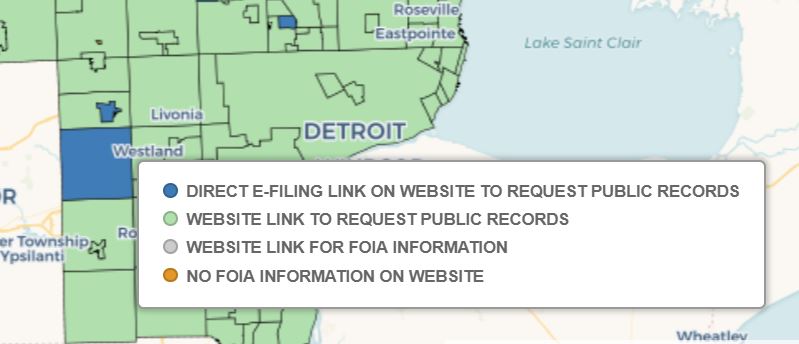Want to Ask Your Local Government for Information? Here’s Help [MAP]
WDET created an interactive map to help you ask your local government for public records.


In his legal work, attorney Tony Sorios has made hundreds of requests for public information from townships, villages and cities – dozens of them in Macomb, Oakland or Wayne counties.
The Farmington-based lawyer uses the state Freedom of Information Act, laws that guarantee the public’s right to ask for and receive documents, reports, e-mail messages and other public records.
“It’s interesting stuff when you file FOIAs,” Sorios says, using the common abbreviation for requests made using the law.
Anyone can file a FOIA request, not just attorneys, journalists or public officials. While the federal FOIA law came in 1966, it was a decade later when Michigan allowed access to records of state agencies and local governments.
Since its enactment in 1977, Michigan’s Freedom of Information law has made available police reports, building inspections, environmental analyses and other public records that have helped the public understand what government is doing.
“It gives citizens what, frankly, we always thought we had which was a right of access to know what’s going on in our government by our leaders, by our elected leaders, what our public bodies are doing,” says Jane Briggs-Bunting, the founding president of the Michigan Coalition for Open Government, a nonprofit that supports transparency in government.
Want to get information from your local government?
Here’s a tool to help:
1. On the map below, click on the township, village or city where you want to request information.
2. Follow the first link to the request form or place to e-file directly.
The above map was compiled with help from Wayne State University School of Information Science students Joseph Gross and Heather Levrant.
3. Municipalities in blue will allow you to e-file your request for information.
4. Municipalities in green have forms online you can download and email, fax or send to receive your records.
5. Municipalities in orange have no information on their websites about the Freedom of Information Act.
More Advice:
1. Narrow your request.
“It’s difficult to just go into City Hall and say, ‘I want to see everything you’ve got on the transit system.’ That’s a little broad and they probably won’t be able to do that for you,” says Dave Cuillier, director of the University of Arizona School of Journalism. “It does take a little leg work and running around and finding out what’s available.”
Specify by address, date, or time. Describe the record you want as accurately as possible.
2. Be prepared to fill out a form for an official record of your request.
“They’ve got to keep a record of who’s asking for what and how to get back to you,” Cuillier says.
3. If you filed a request in one municipality, the process may not be quite the same in another.
From where information is on a website, to how much your request costs, to what the form looks like, there are likely to be differences between the municipalities, a WDET analysis found.
4. Be prepared for redacted information when you get your documents.
Michigan’s law allows for dozens of types of information to be withheld: personal details, trade secrets, ongoing investigations…But read the law, know what might be exempt from your request, and, if information isn’t there that you think should be, there is an appeal process.
